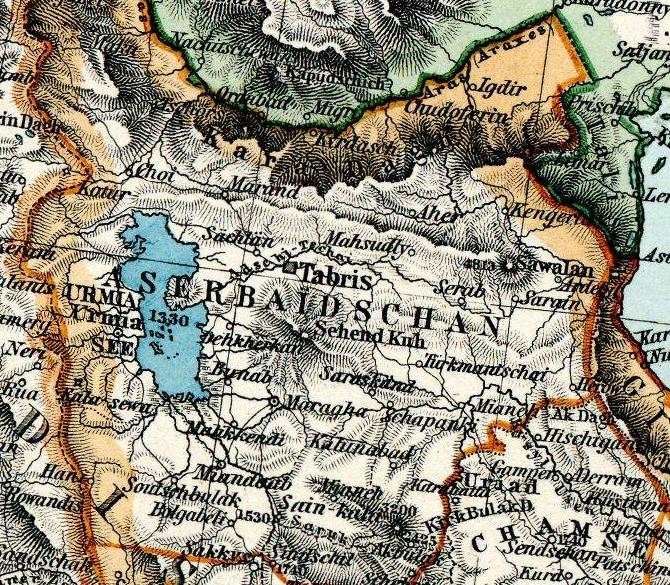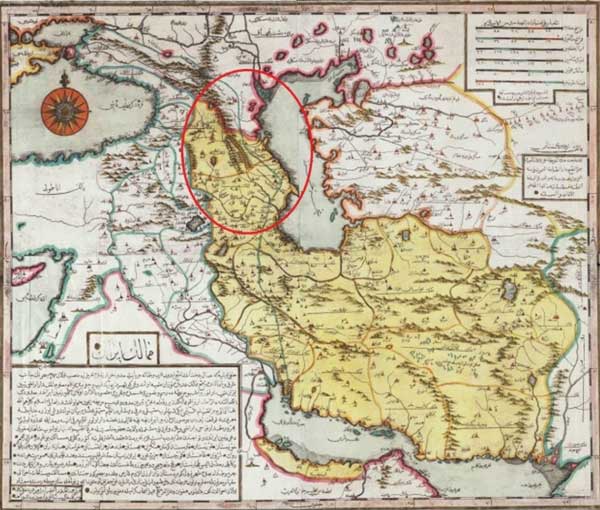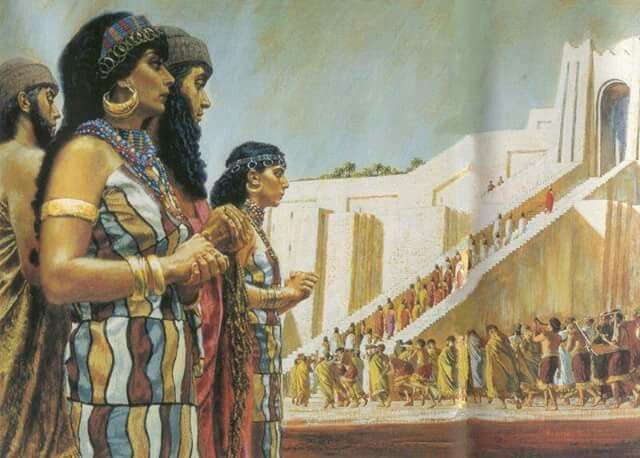The Ancient Language of Azerbaijan

For a better acquaintance with the people and language of Azerbaijan, refer to the section of scientific articles and the article of Atorpatkan
Pan-Turks claim that the language of the people of Azerbaijan has been Turkish since the beginning of history. The issue of language (people living in Azerbaijan) has been a factor of controversy between the extreme Turkish nationalists in the Republic of Azerbaijan and Azerbaijan in Iran in the past and present.
Hamid Ahmadi says about the ancient language of Azerbaijan: "The prevailing opinion is that the current Turkish dialects replaced the native language of Azerbaijan during the continuous waves of Turkic invasions from Central Asia (from the Seljuks to the Mongols) from the 11th to the 13th century AD/5 to 7 AH. .
According to this opinion, before the influx of Turkic-speaking peoples to Iran, the Azerbaijani language, called the Azeri branch, was a branch of Iranian languages. Ahmad Kasravi was an Iranian historian and a linguist from Azerbaijan who raised this issue scientifically for the first time, and many Iranian researchers and Western scientists were fascinated by his theory. Kasravi in his classic work "Azeri or the ancient language of Azerbaijan" which was published in 1304,Based on various Arabic and Persian sources and other historical sources, he argued that the Azeri Pahlavi language of Azerbaijan was one of the remaining languages of Sassanid Iran. Modern Turkish was gradually introduced to Azerbaijan by the Turks who migrated from Gaza from Central Asia during the Seljuk period and following the invasion of the Mongols. The rule of the Mongol and Timurid ilkhans facilitated the replacement of the old Azeri language with the current Turkish, and the emergence of the Safavid dynasty strengthened this change and transformation.
Richard Fry says: "The people of Azerbaijan have been diverse with many accents. Not only did the people there speak Persian, but apparently another Iranian language called Azari was also common there.
Because it is mentioned in several sources that only the people of that province can understand it. Apart from this, they also spoke Arabic. Ibn Hawqal says that most of the people of Azerbaijan and Armenians spoke Persian and Arabic was also understood, especially by merchants and government officials.
He writes in Iranica encyclopedia about Iranian Turkic speakers: "Azerbaijani Turkic speakers are basically the remnants of ancient Iranian speakers, and some of their (ancient languages) still exist in the region. The great migration of Oghuz Turks in the 11th and 12th centuries made not only Azerbaijan, but also Anatolia Turkic.
He writes in Iranica encyclopedia about Iranian Turkic speakers: "Azerbaijani Turkic speakers are basically the remnants of ancient Iranian speakers, and some of their (ancient languages) still exist in the region. The great migration of Oghuz Turks in the 11th and 12th centuries made not only Azerbaijan, but also Anatolia Turkic.
Regarding the Azeri language, Professor Vladimir Minorsky says: "Native and noble people living in rural areas and farmers of Azerbaijan were called by the derogatory title Aluj (non-Arabs) during the Arab conquest.
They used to speak different dialects such as Azari and Talshi, and islands of these languages can still be seen today among the Turkic-speaking people of Azerbaijan. The only weapon of this calm and peace-loving village population was Flakhan, and Babak Khorramdin rebelled against the caliph with the support of this group.
In the Encyclopaedia of Islam, he explains the process of changing the language of the Azerbaijani people as follows: "Around the sixth century of Hijri, under the command of the Seljuks, the Ghoz tribe occupied Azerbaijan first in small numbers and then in significant numbers.As a result, the Iranian-speaking peoples of Azerbaijan and Transcaucasia became Turkic-speaking, although the distinguishing features of the Azerbaijani Turkish language, such as Persian sounds and the neglect of phonetic correspondences, reflect the non-Turkic origin of the Turkic-speaking population.
Professor Gilbert Lazard also says: "The Azeri language was popular in Azerbaijan and it was an important Iranian language, which Masoudi mentions along with Dari and Pahlavi."
Professor Marquardt, a German Iranian scholar, in his book Iranshahr, which he published in Berlin in 1901 AD (1280 AD), stated in the announcement of the geography of Iran about the Azerbaijani language that: the real Pahlavi language is the Azerbaijani language, which was the language of the Parthians.
Behrouz Mahmoudi Bakhtiari writes in the Azeri entry in the Iran Encyclopaedia about the Azeri language: "Azeri is the former language of the people of Azerbaijan, which is a branch of Western Iranian languages.
The people of Azerbaijan used to speak this language before the spread of Turkish. This language, which was one of the important dialects of Iran and was called Azari on the occasion of the name of Azerbaijan, was of the same origin as the language of Ray, Hamedan and Isfahan.
Azari was the dominant language of Azerbaijan until the 7th and 8th centuries AD and was called "Azeriya". This language is also mentioned in the texts as "Pahlavi", "Pahlavi" and "Raji", as in Nozhat al-Qolub, the language of the people of Zanjan is "Right Pahlavi" and the language of the people of Maragheh is "Mirab Pahlavi".
Ehsan Yarshater writes in Iranica encyclopedia: "The language of a vast land like Azerbaijan has undoubtedly not had a single form, but had different dialects.The holy saying that counts the common languages around Ardabil as seventy types, despite its gross exaggeration, should be considered as indicating the same difference of local Azeri dialects.
But on the other hand, the fact that the language of everyone in Azerbaijan is called Azeri - as it appears from the early texts (Islamic history) that it is considered one of the major languages of Iran along with "Dari" and "Pahlavi" - indicates that the common features between these dialects are not so much. Applying a single name to all of them is justified.
Also, there is no doubt that the Azeri language could not have been a continuation of the Median language, that Azerbaijan and the mountains were the home of the Median people, and there is no historical reason that another language replaced the mother tongue in Azerbaijan before the dominance of Turkish.
Except that it is possible to imagine that the Parthian language and then the Farsi language became popular in the major centers of Azerbaijan to a certain extent and created effects in Azari.Because there is no independent work of the ancient Maadi language, and except for some scattered terms, names and words, mostly in the Achaemenid inscriptions, a more accurate diagnosis of Azeri and its characteristics can only be obtained from the study of Azeri works of the Islamic period and also the remains of Azeri in Azerbaijan. It is possible now.
The gradual weakening of the Azeri language began with the influence of Turkish speakers in Azerbaijan. The first group of Turks entered Azerbaijan during the rule of Mahmud Ghaznavi. But it was from the time of the Seljuk rule that the Turkic tribes turned to Azerbaijan in greater numbers and settled there. With the continued dominance of the Turks during the Atabakan period, their number increased and during the Ilkhani Mongol period, most of whose soldiers were of Turkic race and made Azerbaijan their seat, the influence of the Turks increased.
The wars and riots that occurred in the 150-year gap between the rise of the Ilkhans and the rise of the Safavids in Azerbaijan, called more Turkish troops to Azerbaijan, where they settled. The rule of Aqqoyunlu and Qaraqoyunlu in Azerbaijan in the meantime weakened the Azeri language even more, as the Safavid family, which originally - as it appears from the couplets of Sheikh Safiuddin, their great ancestor - were Iranian-speaking, in the same period that coincided with the development of the element Turks were in Azerbaijan, they became Turkic speakers.
The Safavid rule began with the support of the Turkic tribes of Azerbaijan, and the influence of Qazlbash after their establishment increased the prevalence of Turkish and abandoned Azari at least in the major centers of Azerbaijan.
So that little by little Turkish became known as the common language of Azerbaijan and even the word "Azeri" was applied by some Turkish writers and following them by some orientalists to a type of Turkish that is prevalent in Azerbaijan.
Clifford Edmond Bosworth wrote about the language of the people of Azerbaijan and the Republic of Azerbaijan: "We should not take seriously the holy saying that 70 languages are spoken in Azerbaijan, a claim that is more suitable for the Caucasus region to the north, but basically the Iranian population there A dialect of Farsi (called Al-Azariya by Masoudi) is as popular as the Persian language, and geographers say that it is difficult for them to understand this language. In the area north of the Aras River, it is known that Iranians speak a language that has been in Aran for a long time. The rest, which Ibn Hawqal called Al-Arani, spoke "
Sakineh Baranjian disagrees with the use of the term "Azeri" to refer to the current Turkish language and emphasizes: "The historical and linguistic studies of the current century have firmly established that the term "Azeri" in the writings of previous authors refers to the Iranian language of Azerbaijan in the post-Islamic era and It was before the Mongol invasion.
The southwestern Ughuz-Terri language, or what we call Azeri Turkish today, was the language of the Turks who migrated to Azerbaijan during the 11th and 12th centuries and also settled in other parts of Iran, as well as parts of the present-day Soviet Azerbaijan, Eastern Anatolia, and parts of modern-day Iraq. . Azeri Turkish found its definitive form as a literary language after the Mongol invasion in the early 13th century, when various other Turkic tribes joined the earlier migrant inhabitants of Oghuz, the continuous transfer and migration of Turkic elements in the region, Turkish-Azeri enabled it to replace the original "Azeri", or Madi, the ancient language of this region.



